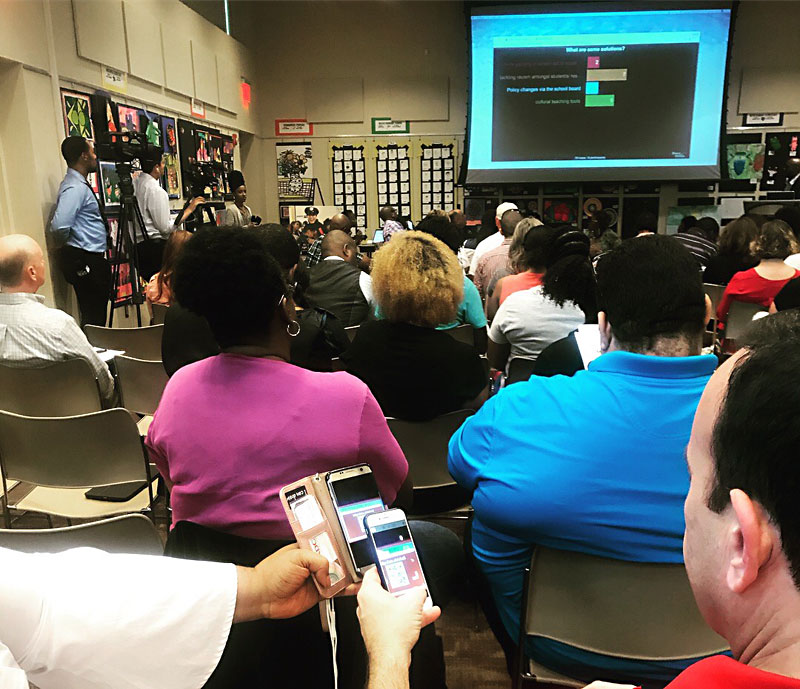How Does School District Policing Support Local Students?
To serve and protect
By Autumn A. Arnett, Fri., Jan. 24, 2020
Last fall, Manor Independent School District announced its intent to create its own police department, to be in place next school year after its contract with the Travis County Sheriff's Office ends. Round Rock ISD, the metro area's second-largest school district, will likely do the same in the future, after both city and county law enforcement agencies gave notice they would be withdrawing their officers from RRISD schools. With increased interest in Central Texas in more progressive approaches to criminal justice and awareness of the impact of current approaches on youth, does this trend represent progress, or does it open the door to overpolicing in the classrooms?
Most students in the Austin metro area attend school in districts with their own police forces, and leaders in those departments understandably see having in-district policing as offering more control to respond to the needs of those students. In Austin ISD, Assistant Police Chief Chris Evoy said school resource officers (SROs) are there to serve four functions: law enforcement, mentorship, counseling and mental health services, and the development of educational opportunities for students.
It is the relationship function, he said, that differentiates district officers from those who are employed by local municipalities and may still have to split time between community calls and school duties. "Kids want to build relationships, they want to be able to go to someone, and we want our school resource officers to be those relationships," Evoy said.
Round Rock ISD is still working to chart out its road to creating a district police department, after the Round Rock Police Department and the Williamson County Sheriff's Office notified RRISD that they would no longer be able to provide officers to the SRO program after 2021. But district officials see this as an opportunity to address concerns that have arisen from community members about the role of police in schools – including bias in the application of school discipline policies and excessive police intervention for minority and special education children.
Take, for instance, "Justin," a now-14-year-old student in a local middle school who suffers from severe mental health challenges, which have only been compounded by the fact that he has been repeatedly criminalized by the school system and arrested by district officers. Justin was arrested for the first time at the age of 9, after a tug-of-war over a basketball led to a teacher falling and assault charges being filed against Justin. Over the next five years, Justin would be handcuffed in school and led out over nonviolent offenses more than a dozen times.
In another case, local activist Meme Styles' son was charged with assault after a little girl fell over in her chair and hit her head on the ground following the son's decision to move his foot, on which the little girl's chair was resting.
"We had just had some [community] conversations about the lack of representation of black kids in GT [gifted and talented]," said Styles, whose son was at Kelly Lane Middle School in Pflugerville ISD at the time. "I think the principal saw that it was me who put [those sessions] on, and needless to say, [my son] was not charged with assault."
A few weeks later, however, Styles said she got a call from a friend whose child was facing the exact same situation, and at the same school. "After that I said, 'There has to be something going on here. Two white girls, two black boys. ... Why are we instantly going to an assault charge?'" Styles said.

Styles, who is president and founder of Measure, an Austin-based nonprofit that touts as its mission its emphasis on using data and education to empower community members to solve community problems, decided to take a look at the data to determine if there was actually a racial disparity in school discipline decisions in Pflugerville ISD schools. The research team found a disproportionate number of Black students were facing assault charges – Black students were being charged with assault 3.5 times more than their white counterparts.
"Of course, it's not a local problem," Styles said. "It's a national problem. So what we did then was mobilize the community to inform them that it's a problem. ... A lot of times, people don't know what to do with the data. Luckily, we do."
The Measure team convened a full panel, which included the chief of police, representatives from Pflugerville ISD, and community members; Styles said that what stuck out most from that meeting was how moved the officers were by the community's involvement. "When we first sat down with [Pflugerville ISD Police Chief Patrick Petherbridge] as a community, he said it was the first time that community members had ever reached out to him," said Styles, reflecting on the emotion felt by all parties. "This tells me there is definitely a lack of communication that goes out from those police departments."
Round Rock ISD Director of Safety and Security Jeffrey Yarbrough said creating its own police department gives the district an opportunity to address some of these issues around bias, with officers sometimes being too quick to criminalize students and funnel them into the school-to-prison pipeline.
"We've considered providing a level of diversity training" and racial equity training, Yarbrough said. The state of Texas mandates that all police officers take diversity training, racial profiling training, and civilian interaction training, but bringing the department in-house will also allow the district's officers to undergo mental health training and racial equity training, and to examine more the concept of restorative practices, Yarbrough said.
"Having our own [police department] – we're looking for diversionary methods and other resources" to resolve conflicts on campuses, Yarbrough said, adding that arresting students should be considered an absolute last resort and only in clear criminal cases, such as bringing weapons on campus.
"Locking up a student, what that does is take the student away from the very resources that they need," Yarbrough said. "Whether that's a counselor, whether that's social services, whether that's someone in the mental health department. ... Arresting someone has to be the last resort if there are other resources you can allocate towards that student.
"It's doing nothing but traumatizing that student," he continued. "We do not want to traumatize our students, we want to make sure they're getting the help that they need from whatever resources that we can allocate to them."
Evoy said school officers, through their relationships with students, also have the ability to evaluate situations on a case-by-case basis. "We have to look at situations," he said. "We always get the families involved, we always try to get all resources available before we try to [arrest] a student ... because the whole point of what we're trying to do here is provide those services so we can help that behavior, so they can get an education and eventually graduate."
But Evoy understands, as others do, that including subjective evaluation metrics opens the door further for individual biases to be the determining factor in who receives which consequences for which offenses. "It's very important that we understand diversity, we understand how to serve our community," Evoy said. "Our officers, we always strive to make sure that we take steps to get that additional training and make sure our officers understand that ... so we can better serve our students and our staff ... making sure we treat people equally and fairly and we understand culture and behavior."
Styles says that data on policing shows that not much has changed in the two and a half years since that Pflugerville community meeting was held. But she remains optimistic that the community, now armed with data and advocacy know-how, can continue to hold departments accountable and push for change. Already, she is encouraged by a shift in attitudes of officers and a willingness to openly and transparently discuss issues around racial bias.
Currently, another Measure team is working to raise awareness around the issues of childhood criminalization and the public health repercussions for students who are so impacted. "The biggest value here is that parents are aware there's an issue," she said, and districts seem "willing, when reached out to, to work towards collaborative solutions."
Got something to say on the subject? Send a letter to the editor.











